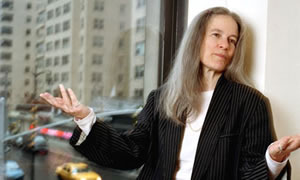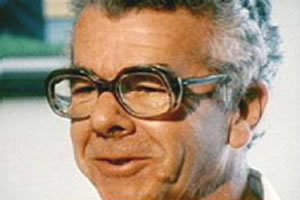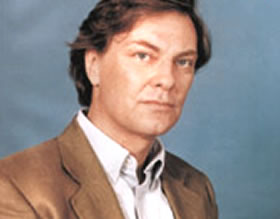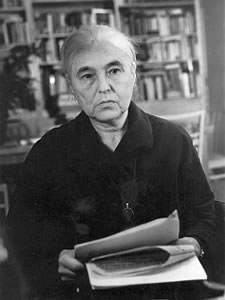De Amerikaanse dichteres Sharon Olds werd geboren op 19 november 1942 in San Francisco. Zie ook alle tags voor Sharon Olds op dit blog.
The Borders
To say that she came into me,
from another world, is not true.
Nothing comes into the universe
and nothing leaves it.
My mother—I mean my daughter did not
enter me. She began to exist
inside me—she appeared within me.
And my mother did not enter me.
When she lay down, to pray, on me,
she was always ferociously courteous,
fastidious with Puritan fastidiousness,
but the barrier of my skin failed, the barrier of my
body fell, the barrier of my spirit.
She aroused and magnetized my skin, I wanted
ardently to please her, I would say to her
what she wanted to hear, as if I were hers.
I served her willingly, and then
became very much like her, fiercely
out for myself.
When my daughter was in me, I felt I had
a soul in me. But it was born with her.
But when she cried, one night, such pure crying,
I said I will take care of you, I will
put you first. I will not ever
have a daughter the way she had me,
I will not ever swim in you
the way my mother swam in me and I
felt myself swum in. I will never know anyone
again the way I knew my mother,
the gates of the human fallen.
Primitive
I have heard about the civilized,
the marriages run on talk, elegant and honest,
rational. But you and I are
savages. You come in with a bag,
hold it out to me in silence.
I know Moo Shu Pork when I smell it
and understand the message: I have
pleased you greatly last night. We sit
quietly, side by side, to eat,
the long pancakes dangling and spilling,
fragrant sauce dripping out,
and glance at each other askance, wordless,
the corners of our eyes clear as spear points
laid along the sill to show
a friend sits with a friend here.

De Amerikaanse schrijver en literaire biograaf Mark Harris (eig. Mark Harris Finklestein) werd geboren op 19 november 1922 in Mount Vernon, New York. Zie ook alle tags voor Mike Harris op dit blog.
Uit: The Southpaw
“I have seen many a pitcher, but there’s few that throw as beautiful as Pop. He would bring his arm around twice and then lean back on 1 leg with his right leg way up in the air, and he would let that left hand come back until it almost touched the ground behind, and he looked like he was standing on 1 leg and 1 arm and the other 2 was in the air, and then that arm would come around and that other leg would settle down toward the earth, and right in about there there was the least part of a second when his uniform was all tight on him, stretched out tight across his whole body, and then he would let fly, and that little white ball would start on its way down the line toward Tom Swallow, and Pop’s uniform would get all a-rumple again, and just like it was some kind of a magic machine, the split-second when the uniform would rumple up there would be the smack of the ball in Tom’s mitt, and you realized that ball had went 60 feet 6 inches in less than a second, and you knowed that you seen not only Pop but also a mighty and powerful machine, and what he done looked so easy you thought you could do it yourself because he done it so effortless, and it was beautiful and amazing, and it made you proud.”

De Oostenrijkse dichter, schrijver en vertaler Christoph Wilhelm Aigner werd geboren op 18 november 1954 in Wels. Zie ook alle tags voor Christoph Wilhelm Aigner op dit blog.
In den See
Leise wie eine Katze
der Lichtstraße des Monds entlang
Aufs eigene Spiegelbild legen
Das Wasser macht einen Schluck
seine Haut durchlaufen Kreise
Verführungen
Wieder stochern Blitze am Horizont
bleibt einer hängen und macht die blühende Flamme
Das zieht ich laufe komm an bei der Asche
Hab doch noch nie einen Phönix gesehn
Wie man das Ende einer Zuneigung spürt
Es ist wie
über flüssige
Stufen gehen

Christoph Wilhelm Aigner (Wels, 18 november 1954)
De Duitse schrijfster Anna Seghers werd op 19 november 1900 geboren in Mainz als Anna Reiling. Zie ook alle tags voor Anna Seghers op dit blog.
Uit: Das siebte Kreuz
“Das ist das Land, von dem es heisst, dass die Geschosse des letzten Krieges jeweils die Geschosse des vorletzten aus der Erde wühlen. Diese Hügel sind keine Gebirge. Jedes Kind kann Sonntags zu Kaffee und Streuselkuchen sein, Verwandten im jenseitigen Dorf besuchen und zum Abendläuten zurück sein. Doch diese Hügelkette war lange der Rand der Welt – jenseits begann die Wildnis, das unbekannte Land. Diese Hügel entlang zogen die Römer den Limes. So viele Geschlechter waren verblutet, seitdem sie die Sonnenaltäre der Kelten hier auf den Hügeln verbrannt hatten, so viele Kämpfe durchgekämpft, dass sie jetzt glauben konnten, die besitzbare Welt sei endgültig umzäunt und gerodet. Aber nicht den Adler und nicht das Kreuz hat die Stadt dort unten im Wappen behalten, sondern das keltische Sonnenrad, die Sonne, die Marnets Äpfel reift. Hier lagerten die Legionen und mit ihnen alle Götter der Welt, städtische und bäuerliche, Judengott und Christengott, Astarte und Isis, Mithras und Orpheus. Hier riss die Wildnis, da, wo jetzt Ernst aus Schmiedtheim bei den Schafen steht, ein Bein vorgestellt, einen Arm in der Hüfte, und ein Zipfelchen seines Schal steht stracks ab, als wehe beständig ein Wind. In dem Tal in seinem Rücken, in der weichen verdunsteten Sonne, sind die Völker gargekocht worden. Norden und Süden, Osten und Westen haben ineinandergebrodelt, aber das Land wurde nichts von alledem und behielt doch von allem etwas. Reiche wie farbige Blasen sind aus dem Land im Rücken des Schäfers Ernst herausgestiegen und fast sofort zerplatzt. Sie hinterliessen keinen Limes und keine Triumphbögen und keine Heerstrassen, nur ein paar zersprungene Goldbänder von den Fussknöcheln ihrer Frauen. Aber sie waren so zäh und unausrottbar wie Träume. Und so stolz steht der Schäfer da, so vollkommen gleichmütig, als wüsste er all das und stünde nur darum so da, und vielleicht, wenn er auch nichts davon weiss, steht er wirklich darum so da. Dort, wo die Chaussee in die Autobahn mündet, wurde das Frankenheer gesammelt, als man den Übergang über den Main suchte. Hier ritt der Mönch herauf zwischen Mangolds und Marnets Gehöft, hinein in vollkommene Wildnis, die von hier aus noch keiner betreten hatte, ein zarter Mann auf einem Eselchen, die Brust geschützt mit dem Panzer des Glaubens, gegürtet mit dem Schwert des Heils, und er brachte die Evangelien und die Kunst, Äpfel zu okulieren.”

Zie voor nog meer schrijvers van de 19e november ook mijn vorige blog van vandaag.
